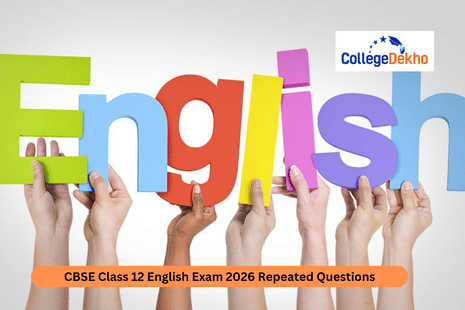
CBSE Class 12 English Exam 2026 Most Repeated Questions are helpful for the final preparation of the exam. By focusing on the topics from where the questions are being repeatedly and practising related questions, students can refine their study plans and approach the exam with greater confidence. CBSE Class 12 English paper is divided into three sections: Reading skills (22 marks), Creative Writing Skills (18 marks) and Literature (40 marks). The question paper consists of competency-based questions, MCQs, short answer and long answer type questions. You should also ensure that you complete the CBSE Class 12 English Syllabus 2025-26 before picking up these questions to understand them. CBSE Class 12 English 2026 exam is scheduled to be held on February 21, 2026. Check out some CBSE Class 12 English Exam 2026 Repeated Questions below.
Also Read CBSE Class 12 English Sample Paper 2025-26
CBSE Class 12 English Exam 2026 Repeated Questions
We have provided the repeated questions below, which aims to help you prepare more effectively and confidently for the upcoming exams. These questions are provided in different format like MCQs, extract-based and descriptive type questions:
| Flamingo | |
|---|---|
| 1. |
Franz saw a huge crowd assembled in front of the bulletin board but did not stop. How would you evaluate his reaction?
a. Franz was too little to care about the news of lost battles. b. Nobody in Franz's family was in the army, so it did not matter. c. Bad news had become very normal, so he went about his task. d. It was too crowded for Franz to find ot what news was up on the board. |
| 2. |
This line from the extract depicts Franz's__________. What a thunderclap these words were to me!
a. confusion about the new language b. astonishment at a wasted opportunity c. disappointment in M. Hamel's teaching d. anger towards the people of the village. |
| 3. |
Unaware of what his name represents, he roams the streets with his friends, an army of barefoot boys who appear like the morning birds and disappear at noon. Over the months, I have come to recognise each of them. “Why aren’t you wearing chappals?” I ask one. “My mother did not bring them down from the shelf,” he answers simply. “Even if she did, he will throw them off,” adds another who is wearing shoes that do not match. When I comment on it, he shuffles his feet and says nothing. “I want shoes,” says a third boy who has never owned a pair all his life. Traveling across the country I have seen children walking barefoot, in cities, on village roads. It is not lack of money but a tradition to stay barefoot is one explanation.
i. What is the writer’s purpose in allowing the boys to speak for themselves via dialogue, as opposed to only a writer’s commentary? ii. Explain any one possible inference that can be drawn from the line, "an army of barefoot boys who appear like the morning birds and disappear at noon". iii. Identify the line from the text that bears evidence of the fact that the writer's association with the boys is not a recent one. iv. Based on the context provided in the extract, select the most likely comment that the writer would have made, based on the boy's reaction to the mismatched shoes. a. "Why are your shoes mismatched? That's not a good look." b. "Don't worry about your shoes, you can wear a matching pair later." c. "I like your shoes. What matters is that they protect your feet." d. "Have you chosen to mismatch your shoes? |
| 4. |
Which of these incidents is similar to what the narrator of 'Deep Water' experienced with swimming?
a. While on a hike with her brother, Rekha fell and scraped her knee. She considered this to be a bad sign and decided never to go hiking again. b. Ali ate at a restaurant that caused him to have food poisoning. He decided to lodge an FIR against the restaurant and eventually tried to shut it down. c. Sarah forgot to submit her homework and was scolded by the teacher for it. She never attended that teacher's class again and eventually failed the subject. d. Kavitha got stuck in an elevator at a mall and refused to ride an elevator for years after the incident. Last week, she managed to get in an elevator with her friend's help for the first time in five years. |
| 5. | Gandhi makes it clear that money and finance are secondary aspects of the struggle in Champaran. Comment on the aspect that you think was most important for Gandhi. |
| 6. | The author of 'Poets and Pancakes' is extremely observant of people and their behavior. Support this statement with an example of a description he gives us about any one of the characters. |
| 7. | The people were left in ‘utter bafflement’ after the English poet’s speech. Mention two things the speaker could have kept in mind before addressing an audience to avoid such a reaction. Give your rationale for it. |
| 8. | Umberto Eco, with reference to "The Name of the Rose" says, “I think if I had written The Name of the Rose ten years earlier or ten years later, it wouldn’t have been the same.” What could he have meant? |
| 9. | What is Sophie’s dream regarding her future? Why does Jansie discourage her from having such dreams? |
| 10. | “Sophie felt a tightening in her throat. She went to look for her brother Geoff.” In the light of this quote, discuss the relationship Sophie shared with Geoff. |
| 11. | Imagery was an effective literary device to bring out the contrast between the “merry children” and the mother. Comment. |
| 12. | Give two reasons why, according to Pablo Neruda, is ‘keeping quiet’ essential to attaining a better, more peaceful world. |
| 13. | ‘Beauty is best left undefined’. Support your position on this statement with your rationale, coupled with ideas in the poem. |
| 14. |
Read the following extracts and answer the questions given: While greedy good-doers, beneficent beasts of prey, Swarm over their lives enforcing benefits That are calculated to soothe them out of their wits, And by teaching them how to sleep they sleep all day, Destroy their sleeping at night the ancient way. (poem-The Roadside Stand)
I. Select the phrase that suggests the following: The so-called aids are not offered out of genuine care or consent but are imposed in a controlling and perhaps unwelcome manner. II. What does the imagery of ‘swarm’ NOT represent in the given extract? A. Coordinated help B. Overwhelming force C. Discomfort and chaos D. Neglect of individual needs III. Complete the following suitably. In the line, ‘destroy their sleeping at night the ancient way,’ the phrase ‘the ancient way’ refers to _____ . IV. Select the correct option from those given in brackets, to fill in the blank. The poet has used phrases like ‘greedy good-doers’ and ‘beneficent beasts of prey’ to illustrate the _____ (irony/satire) in the situation where those claiming to help the rural poor actually impose self-serving and detrimental actions on them. V. Read the assertion and the reason below, with reference to the given extract. Assertion: The poet criticizes the way the rural poor are treated by benefactors, suggesting it instills ambition. Reason: The interventions are overwhelmingly calming and lead to a loss of critical thinking among the rural poor. Choose the correct option regarding their relationship: A. Both the assertion and the reason are true, and the reason is the correct explanation of the assertion. B. Both the assertion and the reason are true, but the reason is not the correct explanation of the assertion. C. The assertion is true, but the reason is false. D. The assertion is false, but the reason is true. VI. State in one sentence, what cautionary advice your address to the rural poor from the extract, is most likely to include. |
| 15. | How does the poet use the image of ‘fingers fluttering through the wool’ to highlight Aunt Jennifer’s victimization? |
| Vistas | |
| 16. | In his letter to Charley, Sam writes, ‘ …then I got to believing you were right .’ What could have made Sam begin to believe? |
| 17. | ‘It’s easy to judge others and give advice, but much more difficult to apply it to ourselves.’ Elaborate with reference to the character of Sam in The Third Level. |
| 18. | The Maharaja justified his actions based on the maxim: ‘You may kill even a cow in self-defense,’ so there would be no objection to killing tigers in self-defense.’ Do you think it is right to justify our actions in this way? Elaborate. |
| 19. | 'Knowing too much of your future is never a good thing.’ In light of this quote, examine how knowing the future paved the way for the king’s end. |
| 20. |
Read the following extracts and answer the questions given:
To visit Antarctica now is to be a part of that history; to get a grasp of where we’ve come from and where we could possibly be heading. It’s to understand the significance of Cordilleran folds and pre-Cambrian granite shields; ozone and carbon; evolution and extinction. When you think about all that can happen in a million years, it can get pretty mind-boggling. Imagine: India pushing northwards, jamming against Asia to buckle its crust and form the Himalayas; South America drifting off to join North America, opening up the Drake Passage to create a cold circumpolar current, keeping Antarctica frigid, desolate, and at the bottom of the world. (Journey to the End of the Earth) I. Complete the following suitably. The passage suggests that visiting Antarctica offers insight into geological processes and Earth's history by _____ . II. How does the author imply the role of geological knowledge in understanding the Earth's past and potential future changes? III. The writer says, ‘When you think about all that can happen in a million years, it can get pretty mind-boggling.’ What is the most likely impact on the writer? A. Feels overwhelmed by the vastness of geological time scales. B. Is uneasy about the rapid pace of geological changes. C. Feels indifferent towards geological phenomena. D. Is surprised by the lack of significant geological events over a million years. IV. How might understanding the geological processes mentioned in the passage help scientists in predicting and mitigating future environmental changes, particularly in polar regions? |
| 21. | ‘It is not merely age but experience that counts.’ With reference to any one example from the text, comment on how Derry found Mr. Lamb different from other adults he had encountered. |
| 22. | A grown-up Zitkala-Sa, reflects on the incident about cutting of her long hair and is conflicted that she did not do enough to resist and surrendered easily. She also wonders if she could have tried something else to prevent the incident. As the grown-up Zitkala-Sa, create a diary entry, expressing these thoughts and conclude by absolving yourself of any blame. You may begin like this: I find myself reflecting on an event that happened many years ago… |
Practice the above repeated questions thoroughly to prepare well for the board exams. Students are also advised to check the CBSE Class 12 English Weightage 2026 to get an idea about the topic-wise marking scheme. All the important questions can be prepared here.
Are you feeling lost and unsure about what career path to take after completing 12th standard?
Say goodbye to confusion and hello to a bright future!

Was this article helpful?



















Similar Articles
Highest Paying Jobs for B.Arch Graduates in India
Can B.Arch be Pursued through Distance Education?
Top 10 Coding Courses for College Students
95 Marks in AP TET 2025 vs AP DSC Weightage Analysis
Which NITs have B.Arch courses?
B.Arch Admission Guide 2026 for Foreign Nationals